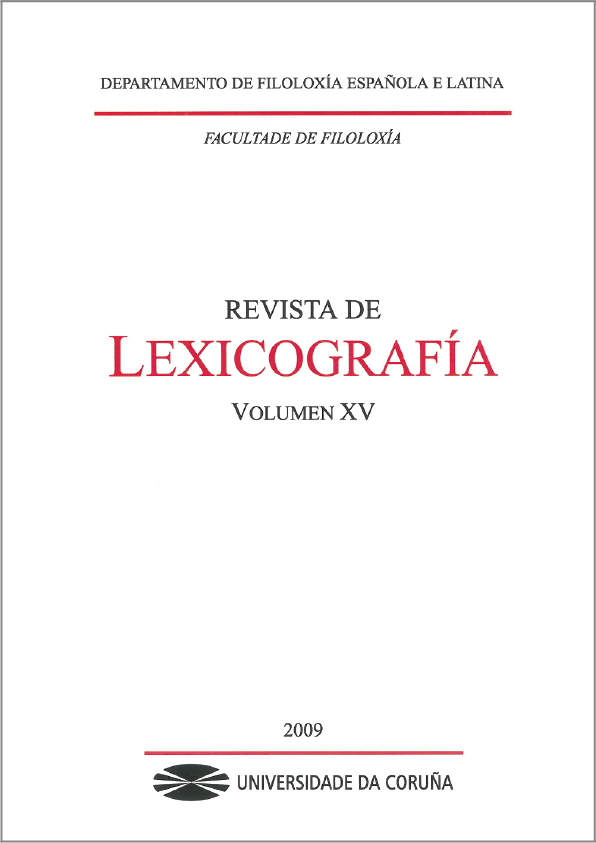Words with conditioned uses. Incorporation in learning dictionaries
Main Article Content
Abstract
Some nominal or verbal terms do not seem to have a lexicographic treatment which encompasses their pragmatic value, understanding as such the use realised by certain terms beyond its literal meaning and its lexical-semantic and syntactic restrictions. The aim of this study is the pragmatic treatment given, in DUE, to nominal terms conditioned by some declarative situations that become relevant, for the user of a learning dictionary, as a production and interpretation tool. We first make a search for pragmatic explanations in the definitions of DUE, departing from the search for verbal expressions which, a priori, due to their syntactic and semantic structure, seem to make possible the introduction of the above mentioned explanation. Later, taking into account the analysis of the verbal expressions used in DUE, a pattern that allows us to add the pragmatic expression is proposed. The configuration of the pattern aims to serve for the subsequent production of new learning dictionaries. Once this pattern is sketched, we analyse the treatment of this kind of information in currently published learning dictionaries of Spanish as a foreign language.
Keywords:
Downloads
Article Details
References
Albert Galera, Josefina (1996): «La pragmática en los diccionarios españoles», en E. Forgas, coord., Léxico y Diccionarios, Tarragona, Universidad Rovira i Virgili, pp. 7-23.
Battaner, Mª Paz (2005): «Dos casos de definiciones morfológicas en los diccionarios», en L. Santos Río, J. Borrego Nieto, J. F. García Santos, J.J. Gómez Asencio y E. Prieto de los Mozos, eds., Palabras, norma, discurso. En memoria de Fernando Lázaro Carreter, Salamanca, Universidad de Salamanca, pp. 125-135.
Bosco, Francesca M., Monica BUCCIARELLI y Bruno G. BARA (2006): «Recognition and repair of communicative failures: A developmental perspective», Journal of Pragmatics, 38, 9, pp. 1398–1429.
Chan, AliceYinWa y Andrew TAYLOR (2001): «Evaluating Learner Dictionaries:What the Reviews Say», International Journal of Lexicography, 14, 3, pp. 163-180.
Casado Velarde, Manuel (1994): «La información textual en el DUE de María Moliner», en Voz y Letra, 5, 1, pp. 129-137.
Corpas, Gloria (1998): «Criterios generales de clasificación del universo fraseológico de las lenguas, con ejemplos en español y en inglés», en M. Alvar y G. Corpas, coords., Diccionarios, frases, palabras, Málaga, Universidad de Málaga, pp. 157-187.
Jiménez, Catalina (2001): Léxico y Pragmática, Frankfurt, Peter Lang.
Leech, Geoffrey (1983): Principles of Pragmatics, London, Longman.
Leech, Geoffrey y Jenny Thomas (1987): «Pragmatics and the Dictionary», en Longman Dictionary of Contemporary English, London, Longman, pp.13-14.
Levinson, Stephen C. (1989): Pragmatics, Cambridge, Cambridge University Press.
Martín Mingorance, Leocadio (1990): «Functional Grammar and Lexematics in Lexicography», en J. Tomaszcyk, y B. Lewandowska-Tomaszcyk, eds., Meaning and Lexicography, Amsterdam, John Benjamins, pp. 227-253.
Nuccorini, Stefania (1993): «Pragmatics in learners’ diccionaries», Journal of Pragmatics, 19, 3, pp. 215-237
Ruiz Gurillo, Leonor (2000): «Cómo integrar la fraseología en los diccionarios monolingües», en Gloria Corpas, ed., Las lenguas de Europa: estudios de fraseología, fraseografía y traducción, Granada, Comares, pp. 261-274.
Sinclair, John, ed., (1987): Looking up, London y Glasgow, Collins.
Szczepaniak, Renata (2006): The Role of Dictionary Use in the Comprehension of Idiom Variants, Tübingen, Max Niemeyer.
Tono, Yukio (2001): Research on Dictionary Use in the Context of Foreign Language Learning. Focus on Reading Comprensión, Tübingen, Max Niemeyer.
Thomas, Jenny (1983): «Cross-cultural Pragmatic Failure», Applied Linguistics, 4, 2, pp. 91-112.
Vázquez, Nancy et al. (2002): «Unidades léxicas no descriptivas: un puente entre la lexicografía y la pragmática», en J. I. Pérez Pascual y M. Campos Souto, eds., Cuestiones de lexicografía, Lugo, TrisTram, pp. 235-247.
Yang, Wen Xiu (2007): «On pragmatic information in learners’ dictionaries, with particular reference to LDOCE4», International Journal of Lexicography, 20, 2, pp. 147-173.
Wingate, Ursula (2002): The Effectiveness of Different Learner Dictionaries, Tübingen, Max Niemeyer.
Zgusta, Ladislav (1988): «Pragmatics, lexicography and dictionaries of English», World Englishes, 7, 3, pp. 243-253.
DICCIONARIOS
Alvar, Manuel (2000): Diccionario para la enseñanza de la lengua española, Madrid, Vox-Universidad de Alcalá [DIPELE].
Briz, Antonio, coord., Diccionario de partículas discursivas del español, en http://textodigital.com/P/DDPD/.
Gutiérrez Cuadrado, Juan y José Antonio PASCUAL (1996): Diccionario Salamanca, Madrid, Santillana-Universidad de Salamanca [Salamanca].
Maldonado, Concepción, dir. (2002): Diccionario de español para extranjeros, Madrid, SM [DEE].
Moliner, María (2001): Diccionario de uso del español, Madrid, Gredos, 2ª ed. (CD-ROM) [DUE].
Santos, Luis (2003): Diccionario de partículas, Salamanca, Luso-Española de ediciones.
Seco, Manuel, Olivia Andrés y Gabino Ramos (1999): Diccionario del español actual, Madrid, Aguilar [DEA].


